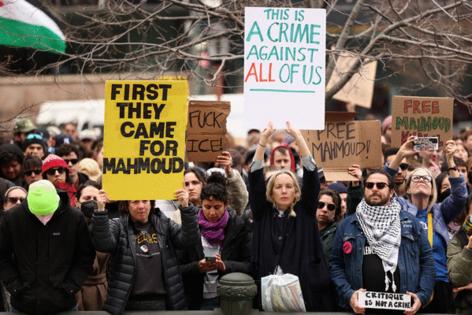Q&A: How is Trump targeting Bay Area international students?
Published in News & Features
Hundreds of international students — including at least several dozen in the Bay Area — have been stripped of their visas and told to leave the country as the Trump administration continues a crackdown on immigrants and foreigners in the U.S.
Since March 27, around 800 students have had their immigration status unexpectedly terminated — in many cases without notice or an explanation given to the students or the universities they attend, schools and immigration advocates say.
Students who have participated in pro-Palestinian activities appear to be particularly vulnerable.
The Trump administration has turned to a 73-year-old legal statute to explain the arrest of pro-Palestine activists, including Mahmoud Khalil, who was detained by immigration officers at his Columbia University-owned home last month over his role in protests against the Israel-Hamas war. Khalil, who is of Palestinian descent and was raised in Syria, had his green card revoked, and an immigration judge ruled Friday that the Trump administration could deport him.
The federal government has argued the Immigration and Nationality Act allows it to revoke green cards and visas for those found to be “adversarial to the foreign policy and national security interests” of the U.S.
Immigration attorneys and advocates say the widespread cancellation of student visas is unprecedented.
“We are witnessing a disturbing trend where international students across the nation are losing their status abruptly and without legal justification,” said Khaled Alrabe, staff attorney at the Washington, D.C.-based National Immigration Project, in a statement.
Here’s what we know — and don’t know — about how the Trump administration is targeting international students and how campuses are responding.
Q: How is the Trump administration targeting international students?
A: Students are impacted primarily in two ways: visas are being revoked and students are being encouraged to voluntarily leave the country or their immigration status is being terminated in the Student and Exchange Visitor Information System (SEVIS) — a web-based system for maintaining information on nonimmigrant students and visitors.
Visa revocations prevent students from reentering the U.S. after leaving, but do not necessarily immediately end an individual’s immigration status, allowing a student to keep legal residency and continue to study in the country. However, SEVIS terminations can immediately strip a student of legal U.S. status.
Universities say the administration is quietly deleting students’ records, forcing schools to actively monitor the system to alert students if they’ve been impacted. Affected students say they’ve lost visas without notice, explanation or a chance to respond.
Q: Which students are being targeted?
A: Typically, international students can lose their legal status when they break the rules of their visa, either by working illegally, failing to maintain academic standing or being convicted of a crime. If students are considered a public safety risk or constitute a national security concern, the government can also revoke their visas.
While criminal convictions have always been grounds for revocation, the administration has gone after students for everything from traffic violations to political activism.
“The trend is that anybody who has any remote interaction with law enforcement while on (a visa) seems to be a priority,” said immigration attorney Ghassan Shamieh with the law firm Shamieh, Shamieh and Ternieden, which has offices in San Francisco and Sacramento.
Immigration advocates say students are concerned about being targeted for expressing views that clash with the administration. Trump’s team has also directed immigration officers to search immigrants’ social media accounts for examples of antisemitism, many times using students’ political activism against the Israel-Hamas war as a reason to detain and deport them.
Q: What happens after a student’s visa is revoked?
A: It depends on the types of visas students have and whether they obtain a grace period. Some students are being told to leave immediately, while others may have 30 days. Students are also not necessarily immediately disenrolled from classes, and some universities have said professors are allowing students to continue their studies online.
Students can apply for reinstatement, although the chance of success “is another question,” given the Trump administration’s tough immigration policies, Shamieh, the immigration attorney, said. Students could also file a lawsuit to get temporary restraining orders and have their SEVIS immigration status reinstated temporarily, Shamieh added, although it’s too early to know if judges will issue them.
Q: Are the Trump administration’s visa revocations and terminations legal?
A: Immigration attorneys say no, and several students — including two at California colleges — have sued the administration over their visa revocations, contending the government needs to provide international students with advance notice and a chance to respond before terminating their immigration status, as well as provide a lawful reason to do so.
Is a speeding ticket really grounds for terminating a visa?, Shamieh asked. “Most attorneys would argue absolutely not.”
Q: How many Bay Area students have been impacted?
A: Exact numbers are unclear, but dozens of Bay Area students have had their visas revoked, including at least six students at Stanford University and three at CSU East Bay.
San Jose State said Wednesday that 12 international students have had their visas revoked. UC Berkeley said Friday that the campus has had a total of 23 visa revocations.
Q: How are schools responding?
A: Schools are monitoring SEVIS. Colleges, including the California State University System, have worked to provide students with immigration attorneys. Some schools, including UC Berkeley, have also warned students against traveling internationally.
But schools also acknowledge that this is new territory and there is little they can do to interfere with federal immigration enforcement.
UC and CSU have said that no campus police department would work with federal immigration officers to investigate or remove students from campus, but the universities also acknowledged that campuses are open to the general public, including federal immigration officers.
_____
©2025 MediaNews Group, Inc. Visit at mercurynews.com. Distributed by Tribune Content Agency, LLC.







Comments